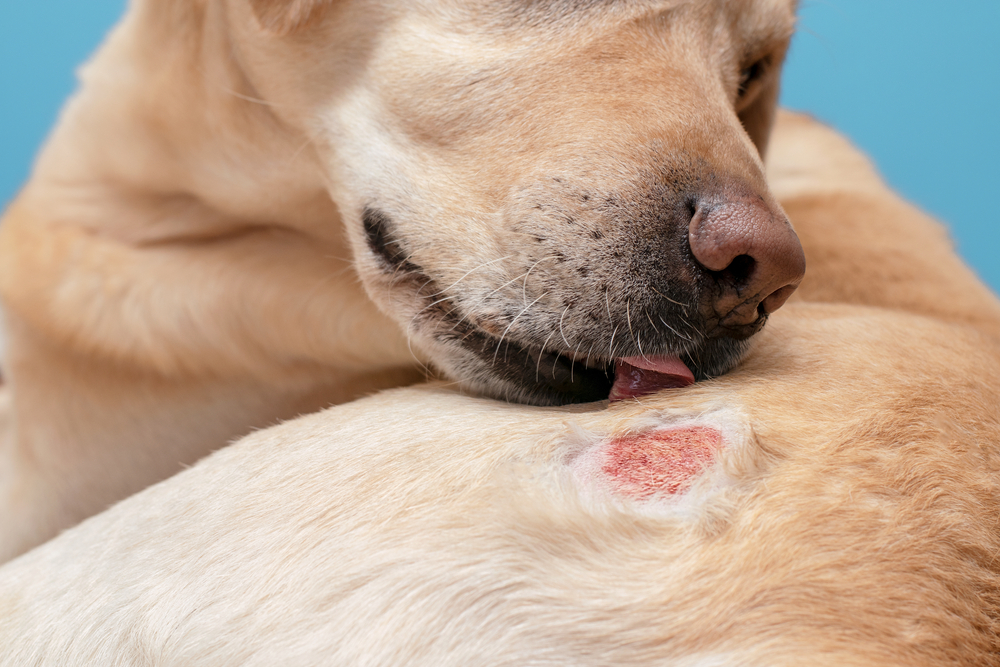Your pet’s internal health has a powerful influence on their behavior and personality. Something as seemingly innocuous as an allergy, which causes constant irritation, itching, and an overactive immune system, not only disrupts their skin, but also their way of life.
Your pet’s recent moodiness, hyperactivity, or general misbehavior may be caused by an underlying allergy. The Veterinary Behavior Solutions team provides more information about this mind-body connection.
Atopic dermatitis (i.e., atopy) in pets explained
Atopic dermatitis (i.e., atopy, allergic skin disease, inhalant allergies) is a common allergy disorder in dogs and cats where they experience an exaggerated immune response to airborne substances such as tree or grass pollens, weeds, dust, or mold.
Unlike humans, pet allergies manifest through the skin rather than the respiratory tract, and cause widespread and persistent itchiness and irritation. Desperate pets seek relief through frequent and intense scratching, biting, and licking that, unfortunately, often worsen their physical and psychological stress and create a vicious cycle of irritation, self-trauma, anxiety, and secondary conditions, such as infection or injury.
Cry for help: How allergies affect your pet’s behavior
If you or someone you know suffers from allergies, you can easily imagine how persistent and frustrating allergy signs, such as intense itching and irritation, can negatively affect your pet’s physical and emotional health. In any species, prolonged (i.e., chronic) discomfort leads to stress, which creates an additional cascade of complications, including decreased immune function, skin barrier disruption, and destructive, dangerous, or uncharacteristic behavior.
In a 2017 University of Nottingham, United Kingdom, study that used survey data from real pet owners, researchers discovered a clear link between allergy severity and inappropriate behavior in dogs. The finding emphasized the need for accurate medical diagnosis prior to behavior or training-based intervention.
Here are the most common ways that allergies influence pet behavior:
- Your pet is lethargic or depressed — Frequent itching and scratching disrupts your pet’s sleep and prevents adequate rest. Continuous scratching, biting, and chewing can also drain your pet’s energy and lead to less physical activity. Stressed pets may lose interest in their favorite activities or no longer seek social interaction, while allergic pets may avoid physical contact if petting and scratching trigger intense itching. Then, the decreased activity and self-induced isolation can result in previously social or active pets becoming despondent and depressed.
- Your pet is anxious, clingy, or hyper — Unlike humans, pets can’t rationalize their itchiness and chronic discomfort, which creates apprehension, anxiety, and hypervigilance. Anxious and restless pets may seek their owner’s constant attention or reassurance, be destructive (e.g., chewing, scratching, or digging), or display uncharacteristically high energy and arousal levels (e.g., “zoomies,” pacing, mounting, food stealing, or begging). Anxious or overstimulated pets may struggle to focus during training and fail to respond to known commands or learn new behaviors.
- Your pet is compulsively overgrooming — Allergic pets may excessively lick, chew, or scratch in an attempt to relieve ongoing irritation and calm their emotional stress. Grooming behaviors such as licking and chewing stimulate a natural endorphin (i.e., feel-good hormone) release, so stressed pets continue the activity, often fixating on specific areas. This excessive grooming can worsen your allergic pet’s irritated skin, resulting in hair loss, inflammation, self-trauma (i.e., wounds, lick granuloma), and secondary bacterial infections.
Untreated compulsive behaviors can progress to a generalized anxiety disorder or other compulsive behaviors, such as pacing, light chasing, and circling.
- Your pet is irritable or aggressive — Pain and discomfort are known to cause stress in pets and can be the first sign of countless health conditions, including allergies. Atopy’s relentless irritation and misery can cause the most docile and social pet to respond negatively to physical contact or perceived threats from human family members or fellow house pets and lash out in self-defense.
Witnessing a previously affable pet’s bad behavior can be difficult, but you need to stay calm and neutral. Harsh reprimands or punishment will only compound your pet’s stress and anxiety and may escalate the situation.
Are allergies causing your pet’s unusual behavior?

Pet owners often blame their pet’s poor behavior on a lack of training, which is important to establish boundaries and expectations, but unexplained setbacks or sudden personality changes typically are because of an underlying health cause.
Sadly, without proper diagnosis, these problematic stress-induced behaviors can strain—or in severe cases, end—the pet-owner relationship. When training alone is not successful, owners may become increasingly frustrated and attempt to rehome their pet.
Don’t let allergy-induced stress and irritation come between you and your four-legged friend. If your pet’s behavior or personality have changed, and they are showing classic allergy signs (e.g., frequent scratching, chewing, licking, and discomfort), consult your regular veterinarian for a full examination and diagnostic testing. Your pet may require a combination therapy to calm their overactive immune system, relieve discomfort, reduce their heightened stress-response, and ease any associated anxiety.
For more information about stress-related behavior in pets, or to discuss your pet’s behavior or allergy needs, contact Veterinary Behavior Solutions.







Leave A Comment